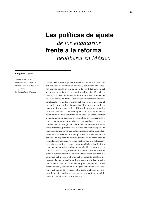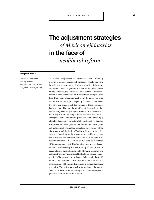Water and watersheds are difficult to separate for management purposes. Providing irrigation as a supplement to rainfall for crop production requires considerable collective action at the watershed level to mobilize labor and other resources, as well as to make decisions and implement the distribution of benefits. Small-scale water harvesting irrigation systems in Mexico have endured for centuries.
Search results
Showing items 1 through 9 of 10.-
Library ResourceJanuary, 2001Mexico
-
Library ResourceJanuary, 2000Mexico, Latin America and the Caribbean
In August 1997 the Mexican government introduced a key component of its overall development and poverty alleviation strategy, the PROGRESA program, in the most marginal rural areas of the country. The expansion of the program across localities took place in phases. By the final phase 11 of the program in early 2000, the program included nearly 2.6 million families in 72,345 localities in all 31 states. This constitutes around 40% of all rural families and one ninth of all families in Mexico.
-
Library ResourceJanuary, 2001Mexico, Latin America and the Caribbean
In early 1998, the International Food Policy Research Institute (IFPRI) was asked to assist the PROGRESA administration to “determine if PROGRESA is functioning in practice as it is intended to by design.” PROGRESA is one of the major programs of the Mexican government aimed at developing the human capital of poor households. Targeting its benefits directly to the population in extreme poverty in rural areas, it aims to alleviate current poverty through monetary and in-kind benefits, as well as reduce future levels of poverty by encouraging investments in education, health and nutrition.
-
Library ResourceJournal Articles & BooksDecember, 2000Mexico
Para las sociedades agrarias, la tierra no es sólo un medio de producción , sino un elemento cargado de significados y valoraciones que define a los individuos, da sentido a su forma particular de existencia y los vincula con un entorno cultural determinado. La tierra es a la vez signo y referente de un conjunto de relaciones sociales que involucra pertenencia y lugar en una estructura social: su posesión puede implicar prestigio y poder sobre otros, y su carencia puede representar subordinación y vulnerabilidad.
-
Library ResourceReports & ResearchDecember, 2000Mexico
Para entender las situaciones y dinámicas en que se debaten las familias rurales de nuestro país actualmente, habría que hacer una breve panorámica de los procesos de transformación que se han venido dando en el medio rural, tanto en términos de la orientación de los patrones de producción como en las condiciones agrarias y en las relaciones sociales a todos los niveles, pues son estos procesos los que han marcado las distintas estrategias de organización para la supervivencia y la reproducción de los grupos sociales en el campo mexicano.
-
Library ResourceReports & ResearchDecember, 2000Mexico
Como fruto de esta división del trabajo socialmente reconocida y aceptada, las mujeres rurales se enfrentan cotidianamente a un sinnúmero de obstáculos para llevar a cabo las actividades productivas, con miras a asegurar la subsistencia de sus familias. De hecho, barreras de orden jurídico, sociocultural e institucional limitan el acceso de las agricultoras a la tierra, así como su control sobre ella.
-
Library ResourceReports & ResearchDecember, 2000Brazil, Argentina, Chile, Mexico, Peru, Italy
Meeting symbol/code: LARC 00 3
-
Library ResourceJanuary, 2001Mexico, Latin America and the Caribbean
This article emphasises that society makes property and that when one society is displaced by another it often is the case that existing property arrangements are recast to favor the newcomers and disadvantage the former inhabitants. With this in mind, the paper explores the displacement process by examining the case of Hispanos in northern New Mexico and their displacement with the takeover of the U.S. government beginning in 1846.The paper finds that:a major disruption in the political economy of northern New Mexico occurred under U.S. governance.
-
Library Resource
Revista de la CEPAL
Journal Articles & BooksDecember, 2000MexicoDesde 1988 el sector ejidatario mexicano se ha visto afectado
por una serie de cambios de política y perturbaciones exógenas
que han puesto en tela de juicio la viabilidad agrícola del
sector en su conjunto. Los cambios --liberalización del comercio,
privatización, reducción de los subsidios, eliminación
de los controles de precios, perturbaciones macroeconómicas,
devaluación y grandes reformas del marco legal que rige el
uso de la tierra en los ejidos-- han llevado a un reordenamiento -
Library Resource
CEPAL Review
Journal Articles & BooksDecember, 2000MexicoSince 1988 the ejido sector in Mexico has been buffeted by a series of policy changes and exogenous shocks that have brought into question the agricultural viability of the sector as a whole. These changes -trade liberalization, privatization, falling subsidies, the abolition of price controls, macroeconomic shocks, devaluation and momentous changes in the legal framework governing land use in the ejido- have led to a radical reordering of the policy framework and incentive structure under which the farmers of these communal lands operate.
Land Library Search
Through our robust search engine, you can search for any item of the over 64,800 highly curated resources in the Land Library.
If you would like to find an overview of what is possible, feel free to peruse the Search Guide.





